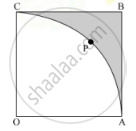Advertisements
Advertisements
Question
A hemispherical bowl of internal diameter 30 cm contains some liquid. This liquid is to be poured into cylindrical bottles of diameter 5 cm and height 6 cm each. Find the number of bottles required.
Solution
Inner diameter of the bowl = 30 cm
Inner radius of the bowl `=(30 "cm")/2= 15 "cm"`
Volume of liquid `= 2/3pir^3 =2/3xxpixx15^3 "cm"^3`
Radius of each bottle = 2.5 cm
Height = 6 cm
Volume of each bottl `=pir^2h = pixx5/2xx5/2xx6=(75pi)/2 "cm"^3`
total number of bottles required `=[(2/3pixx15xx15xx15xx6)/((75pi)/2)]= (2pixx15xx15xx15xx2)/(3xx75pi) = 15xx14=60`
APPEARS IN
RELATED QUESTIONS
If the total surface area of a solid hemisphere is 462 cm2 , find its volume.[Take π=22/7]
A hemispherical depression is cut out from one face of a cubical wooden block such that the diameter l of the hemisphere is equal to the edge of the cube. Determine the surface area of the remaining solid.
The diameters of the lower and upper ends of a bucket in the form of a frustum of a cone are 10 cm and 30 cm respectively. If its height is 24 cm, find:
1) The area of the metal sheet used to make the bucket.
2) Why we should avoid the bucket made by ordinary plastic? [Use π = 3.14]
Prove that the surface area of a sphere is equal to the curved surface area of the circumference cylinder__?
If the radii of circular ends of a bucket 24cm high are 5cm and 15cm. find surface area of
bucket?
In Figure 4, from a rectangular region ABCD with AB = 20 cm, a right triangle AED with AE = 9 cm and DE = 12 cm, is cut off. On the other end, taking BC as diameter, a semicircle is added on outside the region. Find the area of the shaded region.\[[Use\pi = 3 . 14]\]

In Fig. 6, OABC is a square of side 7 cm. If OAPC is a quadrant of a circle with centre O, then find the area of the shaded region. `[\text\ User=22/7]`

The curved surface area of glass having radii 3 cm and 4 cm respectively and slant height 10 cm is ______.
Two cones with same base radius 8 cm and height 15 cm are joined together along their bases. Find the surface area of the shape so formed.
A tent is in the shape of a cylinder surmounted by a conical top. If the height and radius of the cylindrical part are 3 m and 14 m respectively, and the total height of the tent is 13.5 m, find the area of the canvas required for making the tent, keeping a provision of 26 m2 of canvas for stitching and wastage. Also, find the cost of the canvas to be purchased at the rate of ₹ 500 per m2.
